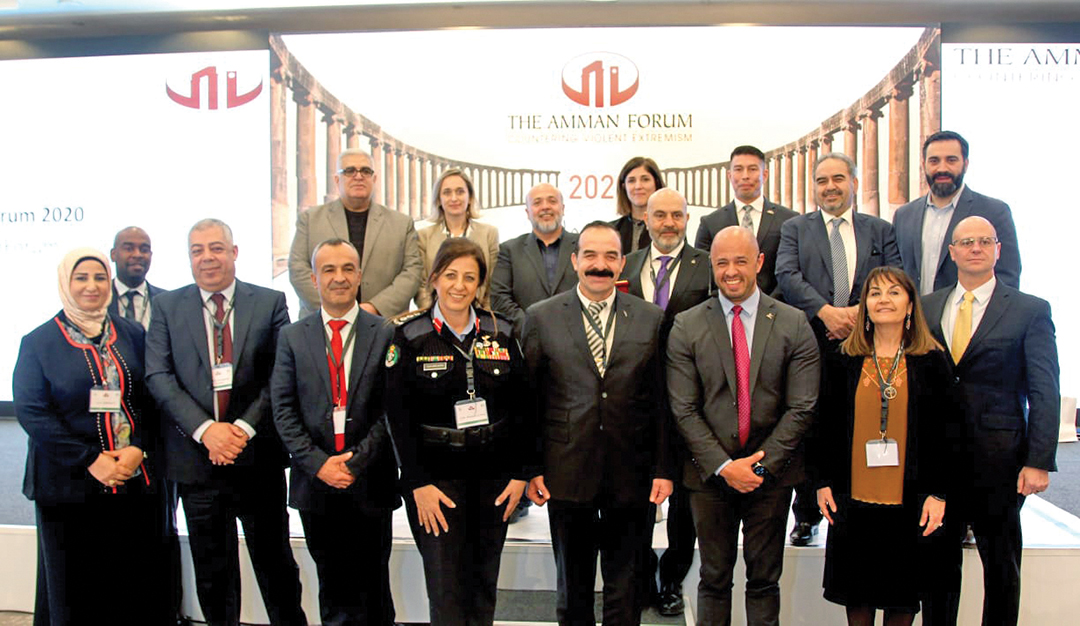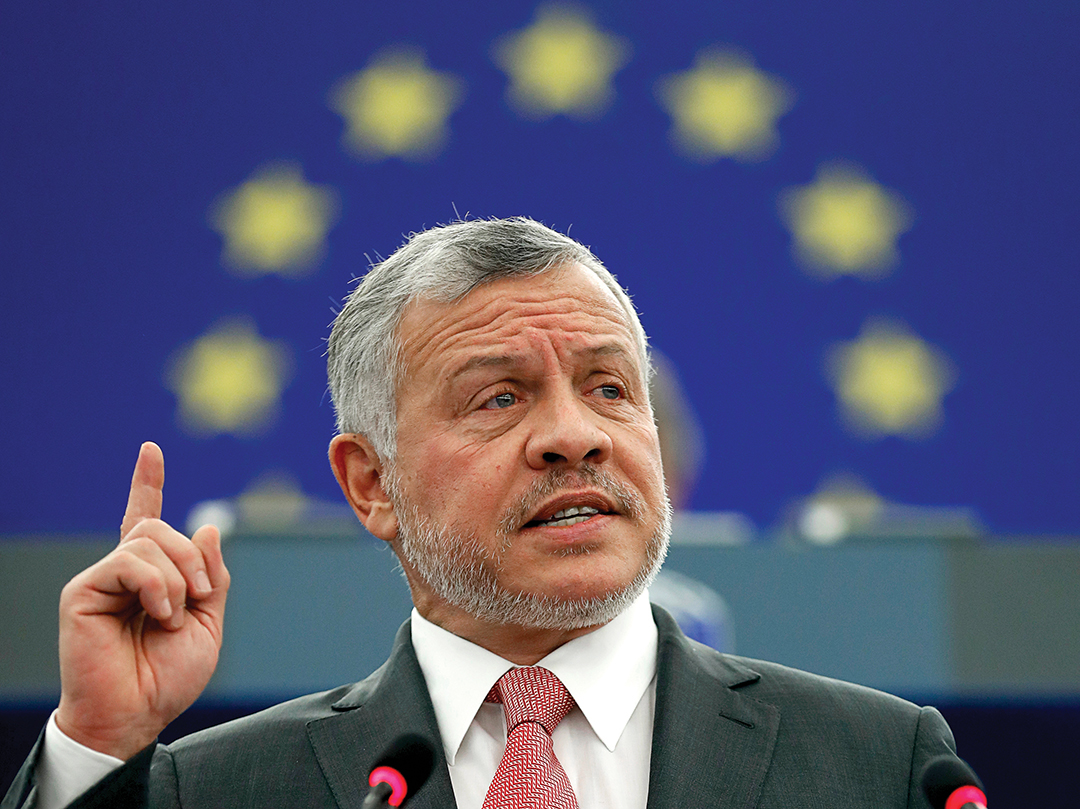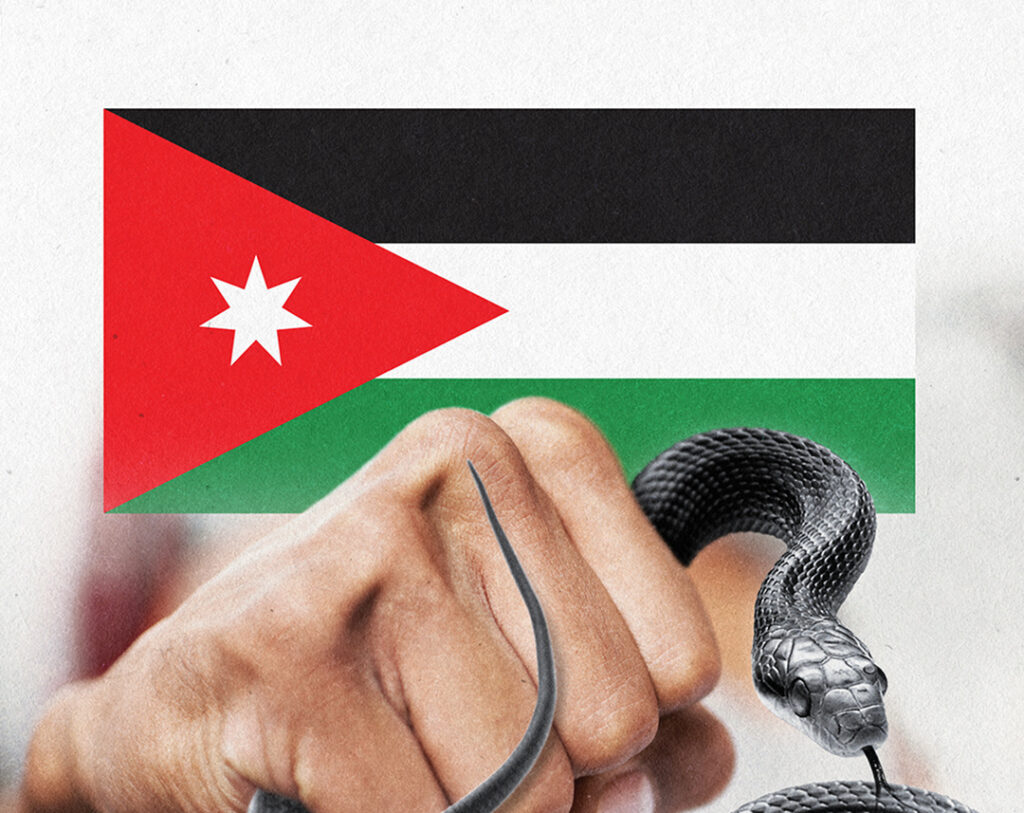The director of the Jordan Military Center for Counter Terrorism and Extremism describes how his country confronts extremism
UNIPATH STAFF
Col. Ahmad Bassam Bani Amer leads the Jordan Military Center for Counter Terrorism and Extremism. This center was established in 2018 in response to the vision of His Majesty King Abdullah II ibn Al Hussein and the directives of the Jordanian state. It operates under the philosophy that the roots of extremism are ideological. So, in the long term, counterextremism and counterterrorism efforts must consist of intellectual and cultural confrontation with those forces preaching violence and anarchy. Col. Bani Amer described the efforts of his center — which held a multinational conference on countering violent extremism in March 2020 — and Jordan’s counterterrorism philosophy in general.
UNIPATH: Tell us about the Amman Conference on Countering Violent Extremism that Jordan hosted in March 2020.
Col. Bani Amer: The second annual Amman Conference on Countering Violent Extremism was held by the Jordanian Armed Forces/Arab Army, in cooperation with our American friends, through the Royal Jordanian National Defense College under the auspices of the Jordan Military Center for Counter Terrorism and Extremism. The most important aims of the conference were reinforcing joint international cooperation with civil society institutions to combat extremism and terrorism, which are trans-border phenomena not exclusive to a particular group, religion or people. They can strike anywhere in which the contributing factors and inciting elements exist. The most important topics of the two-day conference were threats and emerging challenges with regarding intellectual extremism and terrorism, digital internet trends related to the phenomenon, establishing partnerships between government and society, and best international practices to counter the phenomenon. Attendance was widespread with involvement from 27 countries and about 300 distinguished military, security and academic figures from Jordan and abroad.

UNIPATH: What is the Jordan Armed Forces’ role in countering extremism and terrorism?
Col. Bani Amer: The Armed Forces carry out their role in countering extremism and terrorism in accordance with their own preemptive-reactive strategy. This strategy is applied in several focus areas. First is the military focus area. It includes preemptive and reactive measures used by military forces, whether they be preventing illegal entry across the kingdom’s borders, guarding military camps and units or conducting military operations to confront terrorist cells. The overall measures within this focus area are cooperation and coordination with fraternal and allied nations, ongoing building of international alliances, enhancing the capabilities of the Armed Forces and providing them with counterterrorism tools. Second is the security focus, which includes the exchange of information and coordination among security and military agencies at all levels, as well as with allied and fraternal states, and reinforcing the in-depth defensive security deterrent against terrorist activity and extremist ideology. The third focus is ideological. Its role can be summarized as the protection of members of the Armed Forces against extremist ideology, promoting a culture of compassion and countering the culture of violence. This area consists of education and training that promote a culture of dialogue, tolerance and acceptance of others. It also involves religious guidance and awareness of true Islamic values based on the Islamic message of tolerance. The ideological fight also includes the media, which circulates knowledge, awareness and enlightenment, forming opinion and spreading information through print, audio and visual means. And technology must be used to prevent terrorist organizations from using cyberspace to launch attacks that target information systems, computers, programs and data.
UNIPATH: Jordan has been generous in helping refugees from places such as Iraq and Syria. How has the issue of refugees complicated the country’s ability to counter terrorism?
Col. Bani Amer: Jordanian soft power is one of its greatest advantages, whether it be political, social or cultural power. With the onset of the Syrian crisis, waves of asylum seekers began to be registered, numbering more than 620,000, and Jordanian estimates show that the number of nonregistered people residing in the country has reached 1.4 million. Statistically, Jordan is among the world’s largest recipients of refugees. This has been accompanied by an increase in economic, political and social pressures on the kingdom. Some external terrorist cells entered alongside these waves of people, and clandestine extremist activities increased, publishing and promoting extremist ideas through social media. Economic pressures also increased, which caused increased poverty and unemployment, in addition to an increased burden on infrastructure. However, specialized Jordanian security and administrative counterterrorism teams have sufficient expertise to deal with these groups. The geopolitical history of Jordan has prepared it to face contemporary challenges, and despite these challenges, Jordan has offered a humanitarian model that is difficult to emulate, a model that combines pan-Arab authenticity, fraternal sincerity and the nobility of humanitarian values. These have become an integral part of Jordanian soft power and pride, despite the country’s lack of resources.

UNIPATH: How can allies and partners from other nations help Jordan in its counterextremism and counterterrorism campaigns?
Col. Bani Amer: The phenomena of extremism and terrorism are cross-border phenomena that require international and regional opposition be strong and united. Nations can help Jordan in this regard by adopting a joint strategy to coordinate and unite efforts and guide the country in the right direction to combat extremism and terrorism preemptively and reactively. Foreign language satellite television stations geared toward non-Islamic nations can clarify the image of tolerant Islam, reduce discrimination against Arabs and Muslims, and support dialogue among different civilizations and cultures. Allies can support the kingdom’s preventive policies and educational and intellectual centers and institutions concerned with strengthening a culture of compassion, tolerance and moderation. They can aid the kingdom as it combats areas of poverty and improves the living conditions of citizens and refugees and expands the safety nets and social services in the fields of health and education. It is worth noting that the National Action Plan to Combat and Prevent Violent Extremism adopted by the government contains a large number of programs and projects. Interested partners can communicate with the Counter Extremism Unit in the prime minister’s office, where the projects and partnerships are coordinated and implemented.
UNIPATH: How does Jordan play a role in the global campaign to counter extremism and terrorism?
Col. Bani Amer: Through his royal speeches and exalted advice to successive governments, His Majesty King Abdullah II ibn Al Hussein has presented a comprehensive vision regarding the nature of extremist ideology and how to deal with it. His Majesty has put forward a practical approach to counter extremist organizations, with the primary focus on the ideological dimension, by instilling the values of justice, tolerance and moderation, and by providing ideological alternatives. From a military and security perspective, these efforts consist of protecting borders from the threat of terrorism and infiltration by extremists, denying extremists safe haven on Jordanian territory, participation in the Global Coalition Against Daesh and the Islamic Military Counter Terrorism Coalition and establishing de-escalation zones in Syria. In addition, we constantly pursue Daesh elements and their affiliates in Jordanian areas of operations and in other areas outside of Jordan, hindering terrorist plans. From an intellectual perspective, Jordan believes ideas cannot be fought with weapons, so the kingdom has exerted great effort in the field of intellectual protection and exposing extremist ideology. The core message is to spread a culture of tolerance, pluralism and acceptance of others, while not permitting religion to be transformed from a building block of strength and unity into an instrument of destruction and division among people. The National Plan provided the general framework that must be complied with by the various state institutions to achieve tangible, real-life results that limit the spread of extremism and contribute to the protection of society.
UNIPATH: Aside from poverty and lack of education, what contributes to extremism?
Col. Bani Amer: We must distinguish between individual and collective extremism, and between behavioral extremism (terrorism) and ideological extremism. In general, behavioral extremism stems from the interaction of a number of interconnecting factors such as environment, personal psychology and attitudes. These factors are political, social, economic and ideological. There is no single, decisive factor that explains violent extremism; factors are interactive and interconnected and contribute to the phenomenon to varying degrees. Studies show that the general underlying factors that contribute to extremism are a sense of injustice or relative deprivation, a weak sense of belonging, and a threatened identity, in addition to a breakdown of responsibility. Studies have shown that the majority of violent extremism cases result from an emotional state, not from ideology. Poverty, unemployment and personal factors (such as a fanatical character) play a role, but how much of a role they play is inconclusive.
UNIPATH: How can countries avoid becoming breeding grounds for extremism and terrorism?
Col. Bani Amer: There are many factors that can provide a fertile environment for extremist thought to flourish or for extremist behaviors to appear. They must be taken into account when combating the phenomenon. States should promote justice, confront authoritarianism and every sign of oppression and nepotism, and ensure that groups or sects are not marginalized or excluded or physically or psychologically isolated. Countries must develop a sense of belonging for all groups and individuals in society through equal opportunity and developing a spirit of cooperation and collective action. We must broaden participation in political decision-making and promote the role of the opposition, uniting segments of society under a framework of general consensus and focusing on collective identity. We can empower the role of the media and education, particularly those of a religious nature, in enhancing the culture of compassion and countering the culture of violence. Countries need to take necessary measures to deal with returnees from conflict areas to ensure that correctional and rehabilitation centers are not hotbeds for spreading extremist ideology among inmates. Rehabilitated extremists along with their families must be reintegrated into the community. Terrorist organizations must be denied safe havens and territorial control and deprived of media platforms and social support networks. Security and intelligence services need to cooperate on the regional and international levels. Finally, countries must adopt long-term strategies that focus on preventing and draining the sources of extremism.

